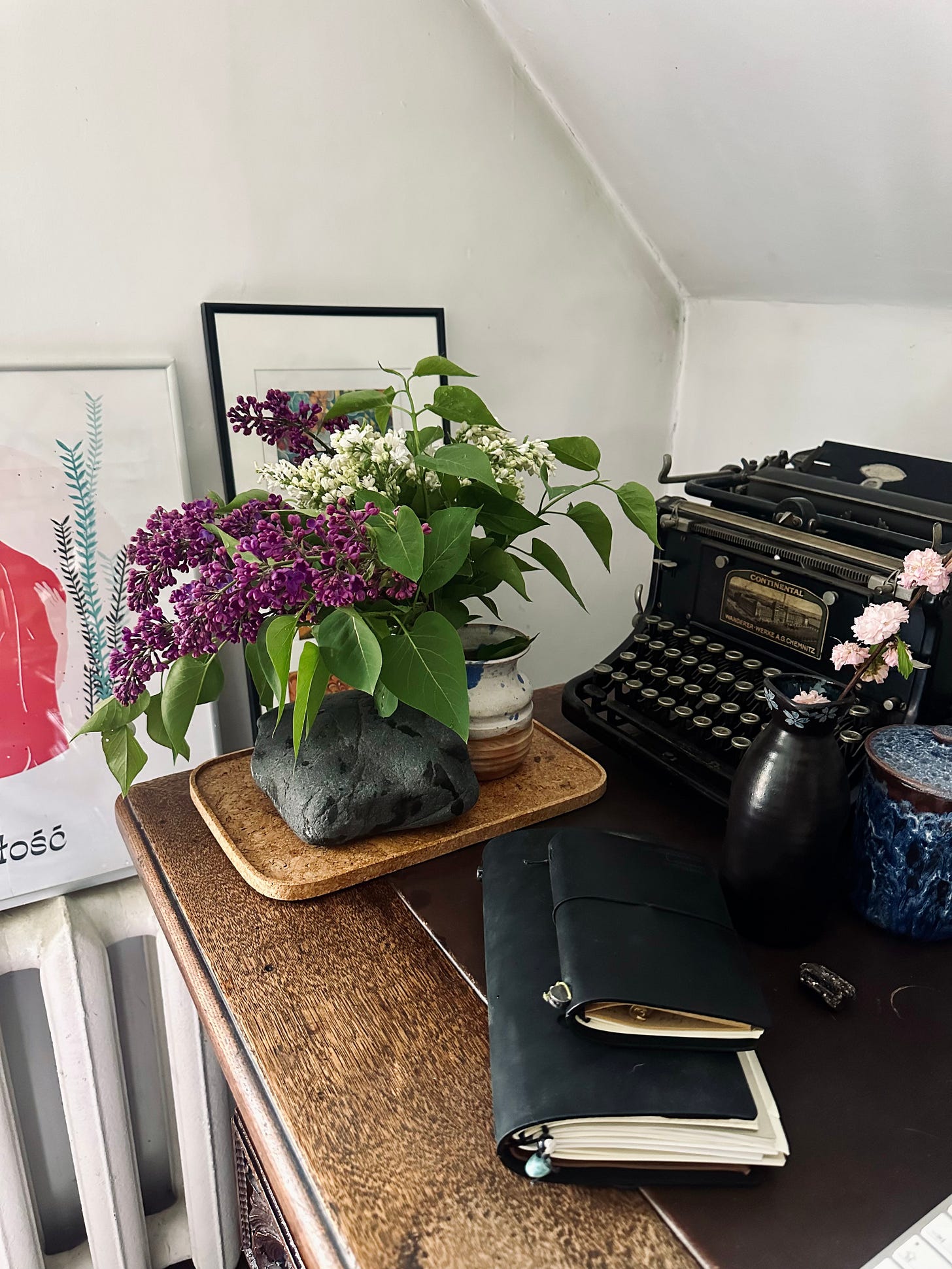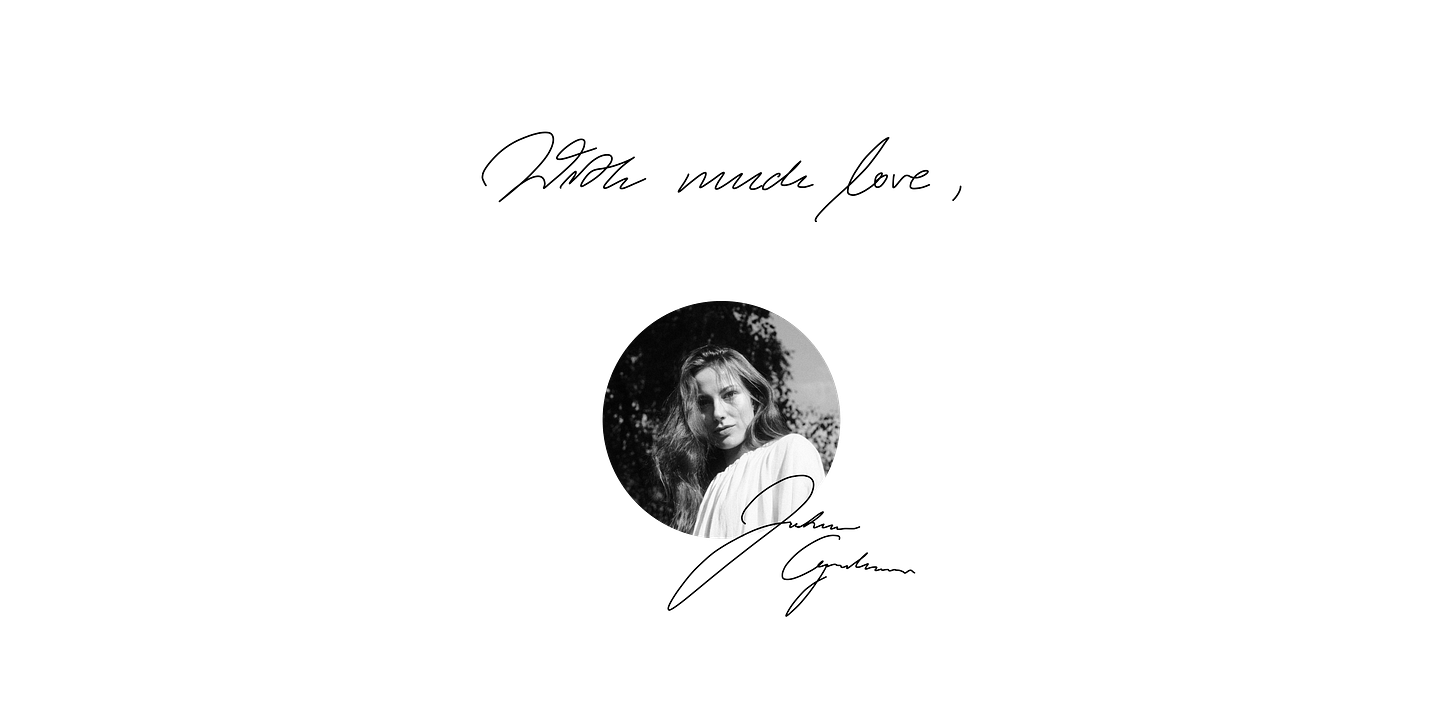Hello dear reader,
How are you this week? What has landed in your empty hands?
A small note if you choose to listen to the voiceover:
I recorded it in my bedroom on a cloudy afternoon. It started to pour rain partway through—not in the soft, poetic way one might hope, but more as a background thud I wasn’t able to edit out.
I’m also still learning how to read in a way that feels true and not too performed. I haven’t quite figured out how to breathe mid-sentence (there were a few near-suffocation moments, haha).
Overall, I’m not entirely happy with how it turned out. Still, I decided to share it as it is, hoping it might offer some kind of softness or a more accessible way of experiencing this poem.
To make it even more chaotic, I included bits of my joyful attempts at playing the kalimba!
Thank you, truly, for listening with kind ears :)
The greenery is lush and daring. It erupted overnight, it seems.
“What stops you from living?”
It seems to be asking through each scandalously green, life-packed leaf, through the white, blossomy splendour—w przepychu skąpane drzewo—behind my window. And the elderflower. Oh, the elderflower. Birthed into this world each May, just as I was, too, some time ago.
I have taken my little notebook with me, which fits in the palm of my hand, and I am walking through the forest as I make my way through these words also. My steps cause a melody with intervals, for I need to stop every now and then to end the sentence.
I place my hand on the furrowed tree skin, pen in between the fingers. Humbled and grateful for its kin’s offering of paper on which I write. Words always come at a sacrifice on someone’s part—most often, it is the silence; perhaps especially when it is silence.
I plan to make one of my usual loops through the forests and the fields, but at this pace, I am not sure I will make it before dusk.
There are flowers on the forest floor, too: bright yellow and violet. I do not know their names, and I doubt they are interested in mine. I greet them as my steps land now closer to paproć, the mysterious lady fern of the forest’s heart.
I have been encountering the same deer family on my walks these days: three, sometimes four quick and magnificent beings. I wonder what that one is up to when it chooses not to join the group.
Even now, as I make my way down into the steep-sided wąwóz, I can hear the deer szleszczące as they pass through the undergrowth, not too far from me, observing. I noticed they have been running slower when they see me lately. I think they know I mean no harm. I think they know we could be friends.
The forest spills itself into my shoes as I traverse it. I would rather go with no shoes at all, but there is too much spikiness here. Either way, it is good. What holds me is always just this step I am taking, no matter how bare or well-adorned.
Being soft does not mean you are any lesser. It means that despite how harsh the world can be, you have held onto your capacity to feel. And sometimes, that means feeling deeply—achingly, wildly—even when it undoes you, even when it does not feel safe or sane. To feel is to move the energy through your body. That is how we make the change: by refusing to stay stagnant.
We long for the assurance of steady progression, yet all around us the rest of nature churns in cycles. “Can you plant a garden to stop a war?” asks Olivia Laing, a British writer and cultural critic known for her explorations of art, solitude, and emotional life.
“It depends how you think about time,” she answers her own question. “It depends what you think a seed does, if it is tossed into fertile soil. But… whatever else you do, it is worth tending to paradise, however you define it and wherever it arises.”
I wrote this poem at the opening of spring, when the flowers had already blossomed, unaware of the last serving of snow still to come in early April.
in every undoing
there is a receiving. I saw a deer’s leg in the grass, still partially covered in fur near the hoof, the other side bare bone. My dog smelled it and I called her away. Let the leg be, I said— and offered love and good wishes to whoever once ran on it, when it was possible still. I have not had much to say lately. Most of attention has gone to quiet observation—holding space for the necessary unravel of the unbecoming. Watching the rough humanness in my father rise to the surface as the illness claims his body, while also seeing the same truth weathering my grandma’s gentle silhouette in pain. Our dog has gone blind in one eye, slowly withdrawing from this finite world into the endlessness he himself contains. When I hold my own hand, I trust I am not alone doing it. Perhaps all of us holding our own hands, stroking our own faces, are, in some ways, offering that to each other also. How vast is the heart? How much can it hold? All of it. Yes. These days, I am drawn to the fields. I used to prefer to walk the forest paths in winter; now my feet long for the grass, eyes yearn for the vast and untethered spaces—bound only by the arbitrary horizon, a line drawn only in thought. The landscape stitched with coarse tufts of grass, hardened by winter, reaching toward light, like we all do. And the blue sky open above me, accessible, holding the sun—its warmth enveloping my skin more closely now. Sometimes, when I walk after the rain, I brush my face underneath the soaked pine branches to receive their blessings. I let the water droplets run through my hair, down the forehead, across the lips, sink into my pores… watering me. This is a time full of life, exactly as life is. In other words, life speaks to us most directly through our bare, rough humanness. At the edge of the forest, early trees blossom— and so do I.
If you find warmth, comfort, inspiration, joy, motivation, or anything else of value in these letters and would like to show your support, please consider becoming a deeply valued patron by upgrading to a monthly or yearly subscription. This will also give you access to the full archive. If you have a financial restriction, please don’t hesitate to contact me.


Before you go:
This poem was a walk. I’d love to know where it met you. If it moved something in you, please share with us.
Here, to aid you in your reflection, some gentle prompts:
What does the horizon look like for you, today?
Where in your life are you beginning to bloom again?
What are you learning to let be, just as it is?











A lovely, thoughtful post, Justyna - both the prose and the poem.
Maybe because walking in nature is my own means to meditation and clarity, I responded very strongly to this. Your forest and fields will be very different to the Australian "bush" as we call it - but the effect is the same. There are days when the sky and the leaves and the rain feel like familiar clothes, and I pull them on, luxuriating in the feeling of them all against my skin.
As you say:
"In other words, life speaks
to us most directly through
our bare, rough humanness."
I am jealous of your spectacular typewriter! You will put it to good use...
My horizon today is a soft interface of moist grey cloud and deep eucalypt green, as rain flows over the river by which we live, and across the low hills beyond.
In my life, I am blooming again as a writer - after a 22 year absence from publishing my work.
And what am I learning to let be, just as it is? Mmmm... that would be aspects of my past. Old loves and old griefs. My writing helps with that.
Best Wishes from Australia - Dave :)
Oh my goodness!
Thank you, Thank you for your AMAZING writing and reading.
I am moved into tears by this now.